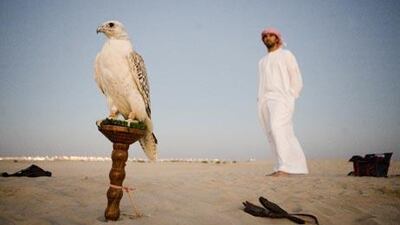ABU DHABI // It is the most awe-inspiring of birds; soaring effortlessly on thermal currents above the desert sands, seeking out its prey with eyesight almost three times more acute than a human's, diving to attack at speeds of up to 320kph - making it the fastest creature on earth.
For countless generations the falcon has been the Bedouin hunting companion of choice, as intrinsic a part of the cultural fabric as the pearl and the dhow; so much so that it was chosen as the national emblem of the UAE in 1973, not long after the nation was founded.
Now falconry has been selected by Unesco, the United Nations cultural agency, as an example of intangible cultural heritage. The idea was proposed by officials from a group of nations including the UAE.
The registration of falconry as an activity integral to human heritage was promoted by the Abu Dhabi Authority for Culture and Heritage (Adach), which has been involved in the sport's preservation and conservation since 1976.
Limited historical records suggest falconry was first practised in Mongolia. It later became a popular sport and pastime in European countries, and was quickly adopted as a means of hunting food in the Arab world.
Dr Margit Gabriele Muller, the director of the Abu Dhabi Falcon Hospital, said the sport was a vital part of the UAE's national identity.
"The inclusion of falconry in Unesco's intangible heritage list is a great reinforcement for all participating countries," she said. "It will put a spotlight on the efforts of Abu Dhabi and the Government and highlight their work as a main driving force in falcon conservation on a national, regional and international level."
"The success of this model is a success of the UAE and Adach in making Abu Dhabi an important cultural hub and is parallel to its well-known international economic importance," said Mohammed Khalaf al Mazrouei, Adach's director general.
"The UAE's contributions extend to contributing to the world's cultural development."
Adach, along with the Emirates Falconers Club and other authorities, including the Environment Agency-Abu Dhabi and the Ministry of Culture, has been working on the project for the past five years, Mr al Mazrouei said.
Officials at Unesco said the falconry presentation was the best file submitted in the cultural heritage category; the collection of documents, films, images and literature was assembled by nations including Belgium, the Czech Republic, Morocco, Saudi Arabia and Syria.
News of the decision was welcomed by Kris Ulens, the chairman of the Belgian Federation for Falconry, which represented the country in the Unesco submission process.
"The Unesco recognition will support all the efforts already undertaken by falconers and will develop a solid base for protecting and raising awareness of the ancient sport," he said. "However, globally, more needs to be done to safeguard it so that we can pass it on to the future generations."
Peter Bergh, who has been a falconer for 12 years and began offering courses in the sport in the Emirates five years ago, said its recognition by Unesco will be a boost to the art. He recently opened a falconry centre in Ras al Khaimah, where he and his staff conduct courses in falconry and hold classes on its history and cultural relevance.
"It has always been an important activity for Arabs, and Unesco's seal of approval will create more awareness," he said. "The Bedouins relied on falcons the same way we rely on supermarkets.
"The UAE's interest in heritage in general, and in falconry heritage in particular, is seen as one of the effective means that contribute to building bridges between people and promoting dialogue between contemporary human cultures," said Mr al Mazrouei.

